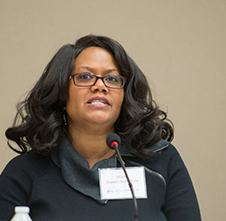
Why is spotlighting Minority Mental Health Month important? What are messages about mental health that are particularly needed for individuals in your community?
Thank you for the opportunity to share my views on these two important issues, mental health and minority outreach. As an African American woman living with bipolar disorder, I am often troubled by the distorted images I see portrayed in the media of people with mental health illness. Most often actions are dramatized for greater emotional appeal, often inducing fear. The suggestion of fear keeps people from getting the help they need or helping others. These images are especially harmful to those in minority communities where I still see a preference for denial of the truth. While there may not be a cure, effective treatment and management is available. Further, getting mental health treatment is not a “luxury,” reserved for the rich. There are affordable healthcare options thanks to the advocacy work of groups such as DBSA. For me, access to mental health treatment is a human right that we must all strive to protect.
How do you feel and see the interaction between your racial identity and your mental health condition interact? What unique or particular challenges, circumstances, or benefits have you experienced as a result?
Although times are changing, I believe that many in the African American community, still feel that they need to be better, smarter, or more … than those in the dominant population in order to be accepted as equals. Mental health illness still is not openly accepted or fully understood. Even those in the limited circle of friends and family that are aware of my condition, they question my diagnosis because I am so “normal.” I joke that I am really getting therapy on behalf of the whole family. I truly believe that there are a lot of people out in the world who need medication and treatment but are unaware or afraid to get it. That needs to change for everyone’s sake.
What is your history and relationship with DBSA? Why did you decide to begin doing work with the DBSA Advocacy team?
I learned about DBSA in the 1990s when I was first diagnosed. At that time, I was eager to understand my illness and myself. There were not nearly as many resources available as there are today. Most people used the term, manic depression, which is accurate but strikes me as overly descriptive. DBSA was very helpful because it welcomes patients, family members, and friends. Being able to invite my sisters to meetings helped a lot. It was nice that we could all come together to better understand and accept my new truth.
As I got better at managing and accepting the diagnosis, I got busy with life – I earned an MBA, got promoted at work, got married, and had a son. I also opened a business, until the economy crashed, and I went down too. I have not experienced mania, since the episode that lead to my hospitalization and diagnosis in 1993. I have, however, suffered other bouts of depression. While everyone experiences sadness, clinical depression is different. It can be deeper and more pervasive. Closing my first business and ending my marriage brought me back into therapy and to DBSA Media. At first, I was very active in the group, running meetings and serving on the Board. I am not a person, however, who is good at keeping to a routine. Now, I attend meetings only when I really want to. I do have a core message to share. “We are not our diagnosis. We are so much more!” I also shared this when I had the privilege of participating in the Beyond Blue Panel Discussion. My vision is that everyone with a mental health diagnosis will find the power and/or help to not only survive but thrive. This is the mindset that fuels me to coach and train speakers and leaders, despite my diagnosis.
What are your biggest mental health related accomplishments so far? What are you proudest to have contributed to?
I have a diagnosis of bipolar disorder, but it is just one piece of the complex puzzle that is me. Like everything, there are times when I see it as an advantage and others when I don’t (I really do not like having to take medicine every day and even worse, getting blood work). I do know that everyone has a set of circumstances to deal with and these are mine.
My diagnosis really helped me to become more accepting of myself and others. In school, I was a perfectionist. I remember being asked to leave class once in high school because I was making a ruckus after getting 98 and not 100 on a test. Several years later after being diagnosed, I have come to terms with what I first called “my broken wing.” I thought bipolar disorder would keep me from succeeding further in life. It was at that point that I really explored issues of self-esteem and faith. I relinquished the illusion of perfection for the reality of who I am, a child of God. I am grateful for who I have become. This insight has led to my eventually forming my company, RISE LEADERSHIP, LLC in which I also help others achieve their goals by first accepting themselves. I can now say that I am proud to be me, an African American woman who is gifted with bipolar disorder and with so much more.


